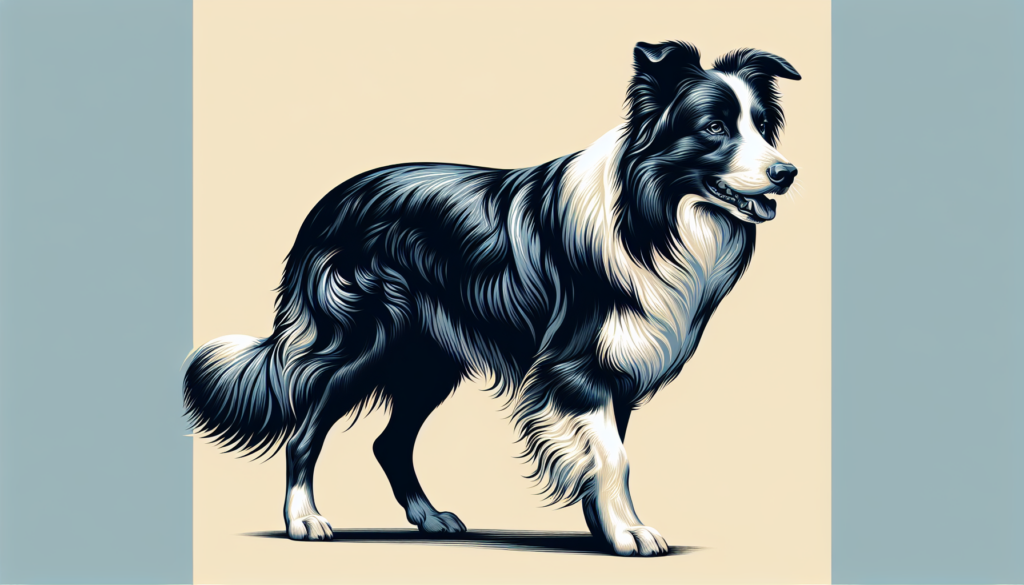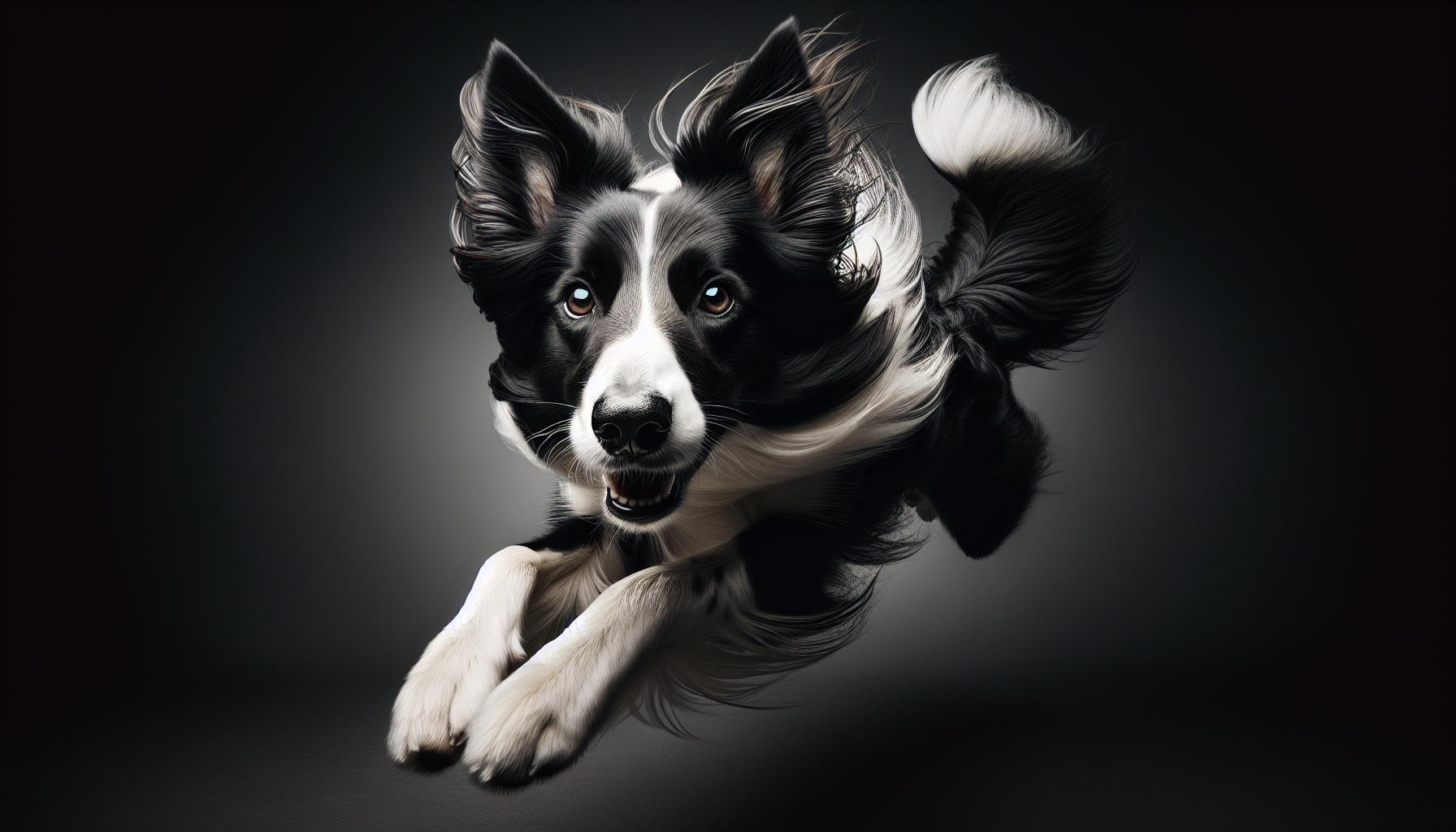Are you curious about the size and weight of Border Collies? Look no further! In this article, we will provide you with all the information you need to know about the dimensions of this beloved dog breed. From their height to their weight, we’ll give you the scoop on the physical characteristics of these intelligent and energetic canines. So, if you’re ready to learn more about Border Collie size and weight, let’s get started!
Physical Characteristics
Height
The Border Collie is a medium-sized breed with a well-proportioned body. When it comes to height, the average range for adult Border Collies is between 18 and 22 inches (45-55 cm) at the shoulder. While this is the general height range, individual variations can occur depending on genetics, gender, and other factors.
Weight
In terms of weight, Border Collies usually fall within the range of 30 to 45 pounds (14-20 kg). However, it’s important to note that weight can vary based on factors such as age, activity level, and overall health. Proper nutrition and regular exercise are key components in maintaining a healthy weight for your Border Collie.
Body Structure
Border Collies have a sturdy and muscular build. They possess a well-proportioned body with a deep chest and strong hindquarters. With their agile frame, they are known for their incredible speed and endurance. This body structure allows them to excel in various physical activities such as herding, obedience, and agility competitions.
Factors Influencing Size
Genetics
Genetics play a significant role in determining the size of a Border Collie. The genes passed down from their parents can influence their height and weight. If both parents are on the larger side, it’s likely that their offspring will also be larger. On the other hand, if the parents are smaller, their puppies will likely be smaller as well. It’s important to consider the size of the parents when obtaining a Border Collie puppy.
Gender
Gender is another factor that can influence the size of a Border Collie. Generally, male Border Collies tend to be slightly larger than females, both in terms of height and weight. However, the difference is usually not significant. It’s important to note that individual variation exists within each gender, and proper nutrition and exercise are more critical than gender in maintaining a healthy size for your pet.
Diet and Nutrition
Diet and nutrition play a vital role in the size and overall health of a Border Collie. Providing a balanced diet that meets their nutritional needs is crucial to ensure proper growth and development. High-quality dog food that is appropriate for their age and activity level is recommended. Overfeeding or feeding them excessive treats can lead to weight gain, so it’s important to monitor their food intake and maintain a healthy diet.

Ideal Size for Border Collies
Height Range
The ideal height range for adult Border Collies is generally between 18 and 22 inches (45-55 cm) at the shoulder. This range allows them to maintain their agility and balance, which are essential for their work as herding dogs. However, it’s important to remember that while this is the ideal range, individual dogs may vary in size. It’s vital to consider their overall health and body condition rather than focusing solely on their height.
Weight Range
The ideal weight range for a Border Collie is typically between 30 and 45 pounds (14-20 kg). However, it’s important to note that this range can vary based on factors such as age, gender, and activity level. Muscle mass and body condition are important considerations when assessing a Border Collie’s weight. Regular exercise and a balanced diet are key in maintaining their weight within the ideal range.
Comparison to Other Breeds
Border Collie vs. Dalmatian Size
When comparing the size of Border Collies to Dalmatians, there are some notable differences. Dalmatians are slightly taller than Border Collies, with a height range of 19 to 24 inches (48-61 cm) at the shoulder. In terms of weight, Dalmatians fall within a similar range to Border Collies, typically between 45 and 70 pounds (20-32 kg). Both breeds are considered medium-sized, but Dalmatians tend to have a more robust and muscular build.
Border Collie vs. Other Herding Breeds
Among other herding breeds, such as Australian Shepherds and German Shepherds, Border Collies tend to be smaller in size. Australian Shepherds, for example, have a height range of 18 to 23 inches (46-58 cm) and a weight range of 40 to 65 pounds (18-29 kg). German Shepherds generally have a height range of 22 to 26 inches (56-66 cm) and a weight range of 50 to 90 pounds (23-41 kg). While all these breeds excel in herding tasks, the Border Collie’s smaller size gives them a distinct advantage in terms of agility and speed.

Size Standards and Variations
Breed Standards
The breed standards set by kennel clubs provide guidelines regarding the ideal size for Border Collies. These standards include criteria for both height and weight, ensuring that breeding programs maintain the desired characteristics of the breed. While variations in size may exist within the breed, adherence to breed standards helps maintain the integrity of the breed and ensures that Border Collies can perform the tasks they were bred for.
Size Variations
Despite the breed standards, variations in size can occur within the Border Collie population. These variations can be influenced by genetic factors, as well as individual growth rates. Some Border Collies may naturally fall on the smaller or larger end of the height and weight ranges. It’s important to consider the overall health, body condition, and functionality of the dog rather than solely focusing on their size.
Growth and Development
Puppy Growth
During the puppy stage, Border Collies experience rapid growth and development. By the age of six months, most puppies will have reached approximately three-quarters of their adult height. However, their muscles and bones continue to develop until they reach full maturity, usually around 12 to 18 months. Proper nutrition and regular exercise play a critical role during this growth stage to ensure healthy development.
Adult Development
Once Border Collies reach adulthood, their growth rate significantly slows down, and their bodies continue to mature and strengthen. Adult Border Collies have a well-developed bone structure and musculature, allowing them to perform their tasks with strength and agility. Regular exercise and a balanced diet are essential components of maintaining their physical condition throughout their adult lives.
Overweight and Underweight Concerns
Health Risks of Being Overweight
Being overweight can have detrimental effects on a Border Collie’s health. Excessive weight can put strain on their joints and increase the risk of developing conditions such as arthritis and hip dysplasia. Obesity can also lead to other health problems, including heart disease, diabetes, and respiratory issues. Keeping your Border Collie at a healthy weight through proper nutrition and regular exercise is crucial for their overall well-being.
Health Risks of Being Underweight
While being underweight is less common in Border Collies, it can also pose health risks. Underweight dogs may have a weakened immune system, making them more susceptible to infections and diseases. They may lack the necessary energy and muscle mass to perform their physical tasks effectively. If you notice that your Border Collie is underweight, it’s important to consult with a veterinarian to identify any underlying health issues and develop a plan to help them reach a healthy weight.
Maintaining a Healthy Size
Exercise
Regular exercise is vital in maintaining a healthy size and overall well-being for a Border Collie. These active and intelligent dogs thrive on physical activity. Aim for a minimum of 60 minutes of exercise per day, including both mental and physical stimulation. Activities such as long walks, jogging, playing fetch, and interactive toys can help keep your Border Collie mentally and physically engaged.
Proper Nutrition
Proper nutrition is key to maintaining a healthy size for your Border Collie. Feed them a high-quality dog food that is appropriate for their age and activity level. Avoid overfeeding or feeding them table scraps, as this can lead to weight gain and potential health issues. Consult with your veterinarian to determine the appropriate portion sizes and feeding schedule for your Border Collie.
Regular Vet Check-ups
Regular veterinary check-ups are crucial for monitoring your Border Collie’s size and overall health. Your veterinarian can assess their body condition, provide guidance on nutrition and exercise, and identify any potential health concerns. These check-ups also allow for early detection and prevention of diseases or conditions that may impact your Border Collie’s size or well-being.
Monitoring and Assessing Size
Physical Examination
Regular physical examinations by a veterinarian are essential for monitoring and assessing your Border Collie’s size. During these examinations, the veterinarian will measure their height at the shoulder and assess their weight. They will also conduct a thorough examination of their overall health, including checking their body condition, muscle tone, and joint health. These examinations help ensure that your Border Collie is maintaining a healthy size and can detect any potential health issues.
Body Condition Scoring
Body condition scoring is a useful tool to assess your Border Collie’s size and determine if they are within a healthy weight range. This scoring system evaluates the amount of fat covering the dog’s ribs, spine, and hips, as well as the overall shape of their body. A veterinarian or a trained professional can perform this assessment and provide guidance on maintaining an ideal body condition for your Border Collie.
Conclusion
Ensuring that your Border Collie maintains a healthy size is crucial for their overall well-being and quality of life. Factors such as genetics, gender, and diet play significant roles in determining their size. Regular exercise, proper nutrition, and veterinary care are key in maintaining a healthy weight for your Border Collie. By monitoring their size, body condition, and overall health, you can ensure that your beloved companion thrives in both physical and mental aspects.
